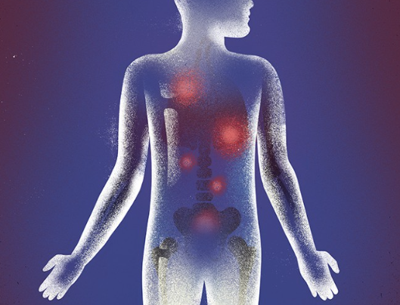
Metastatic prostate cancer- where cancer has spread beyond the prostate gland to other parts of the body - remains one of the most challenging stages to treat. For years, the main options included hormone therapy, chemotherapy, and external beam radiation. While these treatments can slow the disease, they often come with side effects and limited long-term control.
Prostate cancer is the second most common cancer in men worldwide, with over 1.4 million new cases diagnosed in 2020 according to the World Health Organization (WHO). Around 10–20% of prostate cancer patients eventually develop castration-resistant metastatic disease, meaning the cancer progresses despite hormone therapy.
Once metastases appear - often in bones, lymph nodes, or organs - the treatment goal shifts from cure to control; however, precision-targeted therapies are now showing that durable remission is possible in some patients.
Lu-177: Precision Radiation from the Inside Out
Lutetium-177 is a beta-emitting isotope that is attached to a molecule designed to seek out prostate-specific membrane antigen (PSMA) - a protein found in abundance on prostate cancer cells. Once injected, the therapy travels through the bloodstream, binds to PSMA, and delivers a lethal dose of radiation directly inside the cancer cell, leaving surrounding healthy tissue largely unharmed.
In the VISION Phase III trial published in the New England Journal of Medicine in 2021, adding Lu-177-PSMA-617 to standard care extended median overall survival from 11.3 months to 15.3 months and doubled radiographic progression-free survival. Many patients also reported meaningful relief from bone pain - a standard and debilitating symptom in advanced disease.
Ac-225: The Alpha Particle Advantage
While Lu-177 is highly effective, some tumors eventually stop responding. This is where Actinium-225 (Ac-225) comes in. Instead of beta particles, Ac-225 emits alpha particles — tiny, high-energy radiation beams with a very short range.
That short range allows Ac-225 to destroy cancer cells with extraordinary precision while sparing nearby healthy tissues. It can also damage cancer DNA more severely, making it especially potent against small clusters of cells that resist other therapies.
In early clinical studies, Ac-225-PSMA therapy led to a PSA decline of 50% or more in over 90% of patients who had already exhausted other treatment options. Some even achieved complete remission on imaging scans, though side effects like dry mouth remain a challenge.
DC Vaccines: Teaching the Immune System to Fight Back
Destroying cancer cells is one thing; preventing them from returning is another. Dendritic cell vaccines are designed to train the immune system to recognize and attack prostate cancer long after other treatments have finished.
The process begins with collecting a patient’s blood to isolate dendritic cells - the “commanders” of the immune system. These cells are then exposed to prostate cancer–specific antigens in the lab, essentially “teaching” them what to look for. When the trained cells are returned to the patient, they can direct the immune system to hunt down and destroy cancer cells, even those too small to be seen on scans.
An FDA-approved version of this approach, Sipuleucel-T, has already shown a survival benefit in late-stage prostate cancer. Newer, fully personalized DC vaccines are being tested with the goal of generating stronger, longer-lasting immune responses.
Potential Providers for Advanced Prostate Cancer Treatments
Through AiroMedical’s global network, patients gain access to top-tier clinics and specialists for cutting-edge metastatic prostate cancer therapies—including Lu-177 PSMA radioligand therapy, and emerging options like Ac-225 treatments and personalized immunotherapies. Here are some of the standout providers available:
Prof. Dr. med. Stefan Dresel – Helios Hospital Berlin-Buch, Germany
Prof. Dr. Dresel is a leading figure in nuclear medicine, serving as the Chief Physician at Helios Hospital Berlin-Buch. He has been instrumental in pioneering Lutetium-177 PSMA therapy for prostate cancer patients. His department specializes in advanced diagnostics and treatments, including PET/CT imaging with Ga-68 PSMA, SPECT diagnostics, and radioiodine therapy.
Prof. Dr. med. Wolfgang Weber – University Hospital Rechts der Isar, Munich, Germany
Prof. Dr. Weber is the Director of the Department of Nuclear Medicine at the University Hospital Rechts der Isar in Munich. With over 20 years of experience, he specializes in molecular imaging and targeted radionuclide therapy. His research focuses on theranostics, combining imaging and therapy for cancer treatment. The department offers a full range of services, including diagnostics and treatment of tumors, diseases of the thyroid gland, kidneys, brain, and heart.
Prof. Dr. med. Samer Ezziddin – Saarland University Hospital, Homburg, Germany
Prof. Dr. Ezziddin is the Director of the Clinic for Nuclear Medicine at Saarland University Hospital in Homburg. He is an international expert in the treatment of neuroendocrine tumors and targeted radionuclide therapy. His expertise extends to radioembolization, diagnostics of thyroid pathologies, and multimodal imaging using PET-CT and SPECT-CT scans.
Univ. Prof. Dr. med. Werner Langsteger – University Hospital Vienna (AKH), Austria
Prof. Dr. Langsteger is a highly experienced nuclear medicine specialist with 45 years of practice in the field. He has made significant contributions to nuclear medicine and endocrinology, earning recognition as a critical figure in the industry. His expertise is showcased through 267 scientific publications, focusing on bone imaging, prostate cancer detection, and molecular imaging.
These specialists are accessible through platforms like AiroMedical, which facilitates international medical travel for patients seeking advanced treatments. Each of these professionals offers a wealth of experience and expertise in the field of nuclear medicine, particularly in the treatment of advanced prostate cancer.


(0) comments
We welcome your comments
Log In
Post a comment as Guest
Keep it Clean. Please avoid obscene, vulgar, lewd, racist or sexually-oriented language.
PLEASE TURN OFF YOUR CAPS LOCK.
Don't Threaten. Threats of harming another person will not be tolerated.
Be Truthful. Don't knowingly lie about anyone or anything.
Be Nice. No racism, sexism or any sort of -ism that is degrading to another person.
Be Proactive. Use the 'Report' link on each comment to let us know of abusive posts.
Share with Us. We'd love to hear eyewitness accounts, the history behind an article.